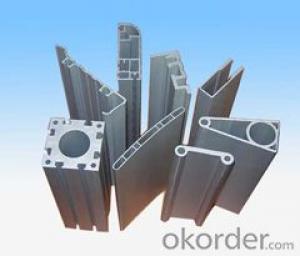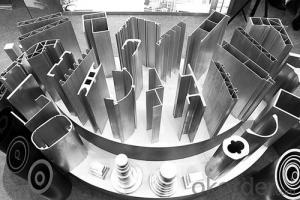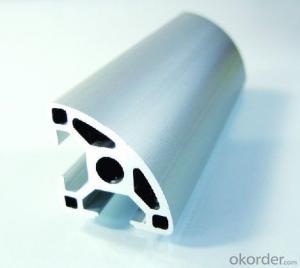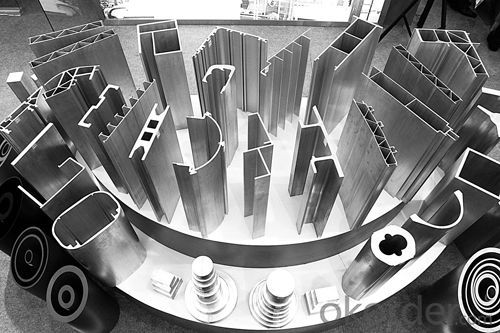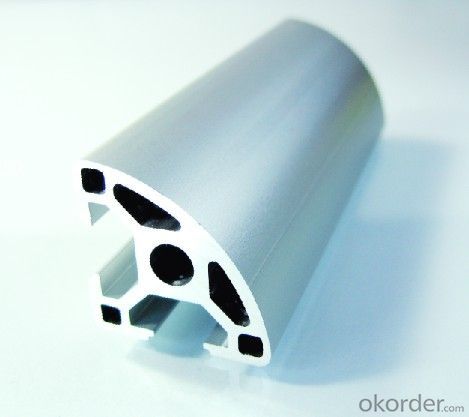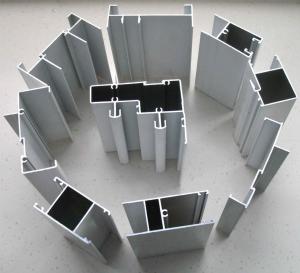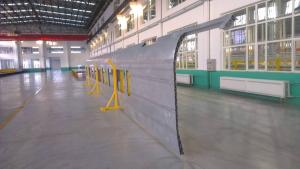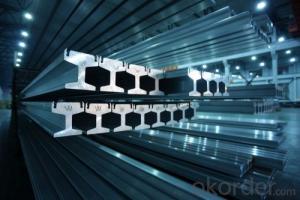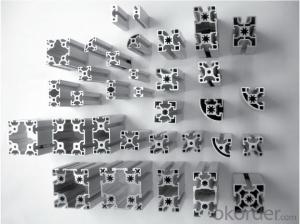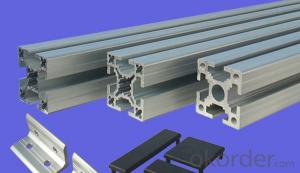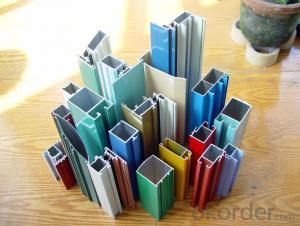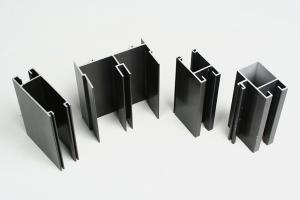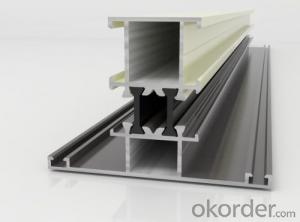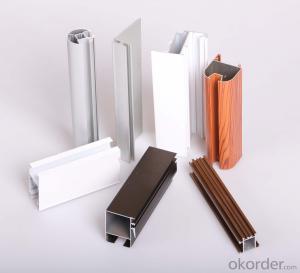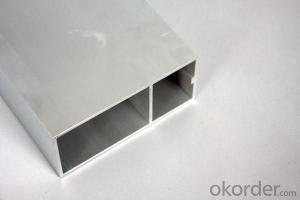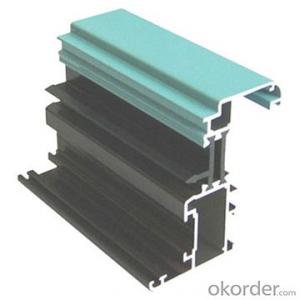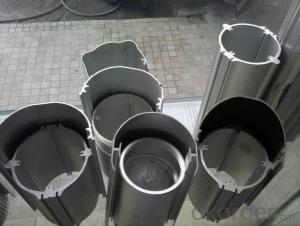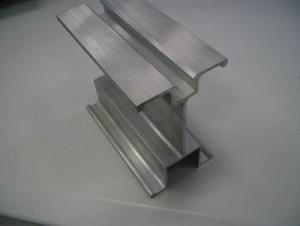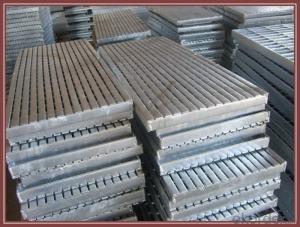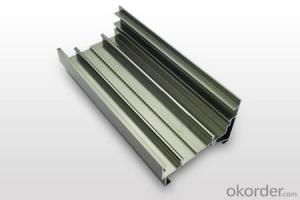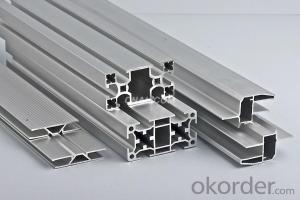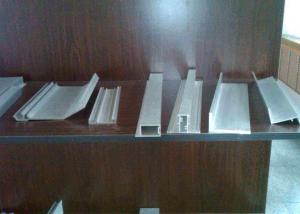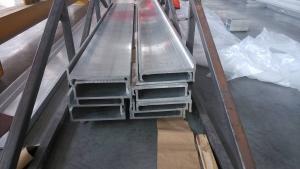Aluminum Alloy Extrusion Profiles for Aluminum Section and Aluminum Window Profile
- Loading Port:
- China Main Port
- Payment Terms:
- TT OR LC
- Min Order Qty:
- -
- Supply Capability:
- -
OKorder Service Pledge
OKorder Financial Service
You Might Also Like
Aluminium is a relatively soft,durable, lightweight, ductile and malleablemetal with appearance ranging from silvery to dull gray,depending on the surface roughness. It is nonmagnetic and does not easilyignite. A fresh film of aluminium serves as a good reflector (approximately92%) of visible light and an excellent reflector (as much as98%) of medium and far infrared radiation. The yield strength of pure aluminium is 7–11 MPa,while aluminium alloys have yield strengths ranging from200 MPa to 600 MPa. Aluminium has about one-third the density and stiffnessof steel. It iseasily machined,cast, drawn and extruded.
Aluminum Profile
Material | Alloy 6063,6061,6005or according to customer’s choice |
Temper | T3, T4, T5, T6 |
Surface | Anodize, electrophoresis, powder coating, PVDF coating, wood grain painting, matted, etc. |
Length | Coating 6.5 meters, Anodizing 6.5 meters, Mill finish 5 meters |
Application | Industrial, electrical equipment(TV set, air conditioner, refrigerator, computer), decoration,construction, transportation |
Custom Made | We can package following with customer's request. |
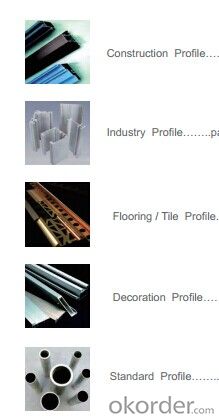
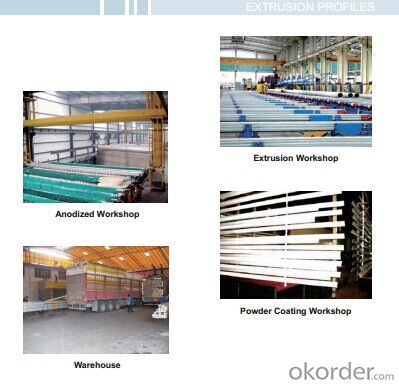
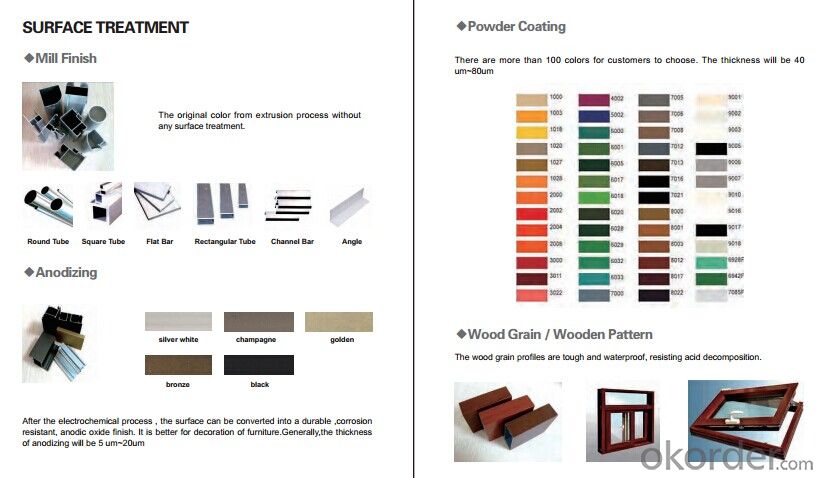
- Q: Are aluminum profiles suitable for lighting fixtures?
- Yes, aluminum profiles are suitable for lighting fixtures. Aluminum is lightweight, durable, and has excellent thermal conductivity, making it ideal for dissipating heat from the light source. It also offers design flexibility, allowing for various shapes and sizes of lighting fixtures. Additionally, aluminum profiles can be easily customized, painted, or anodized to achieve the desired aesthetic appeal.
- Q: Can aluminum profiles be used for industrial workbenches?
- Yes, aluminum profiles can be used for industrial workbenches. Aluminum is a lightweight and durable material that is resistant to corrosion, making it suitable for various industrial applications. Aluminum profiles can be easily customized, allowing for the construction of workbenches with specific dimensions and configurations. Additionally, aluminum profiles are often available in a wide range of sizes and shapes, providing flexibility in design. Overall, the use of aluminum profiles for industrial workbenches can offer strength, versatility, and longevity.
- Q: we recently entered a batch of aluminum billet, under the rain, billet oxidation, spray finished drawing after the profile off the skin, how to do
- Before treatment, not dealt with, must be dealt with before spraying, this situation.
- Q: Are aluminum profiles capable of being tailored to fit the unique specifications of a construction project?
- <p>Yes, aluminum profiles can be customized to meet specific requirements of a building project. They offer versatility and flexibility, allowing for adjustments in size, shape, and design. Manufacturers can produce aluminum profiles with varying thicknesses, lengths, and finishes to suit the project's structural and aesthetic needs. Customization may include specific bends, cuts, or holes to ensure compatibility with other building components. This adaptability makes aluminum profiles a popular choice for various construction applications, from window frames to structural supports.</p>
- Q: This question asks for a comparison between aluminum profiles and other materials used in constructing frames, focusing on their characteristics and performance.
- <p>Aluminum profiles are favored for building frames due to their high strength-to-weight ratio, making them lightweight yet durable. They offer excellent corrosion resistance, which is superior to materials like steel, which can rust. Aluminum profiles are also easy to machine and form, allowing for complex designs. Compared to wood, they are more resistant to weathering and pests. However, they may not have the same aesthetic appeal as wood or the thermal insulation properties of some plastics. Overall, aluminum profiles are a strong choice for structural integrity and longevity in frame construction.</p>
- Q: How do aluminum profiles perform in terms of water resistance?
- Aluminum profiles generally exhibit good water resistance due to their natural properties. The metal itself is corrosion-resistant, which means it does not easily rust or degrade when exposed to water. Additionally, aluminum profiles can be further treated with coatings or anodization processes to enhance their water resistance capabilities. These surface treatments create a protective layer that prevents water from penetrating the metal, reducing the risk of damage or deterioration over time. However, it is important to note that the water resistance of aluminum profiles can vary depending on the specific alloy, surface treatment, and maintenance practices. Regular cleaning and proper sealing of joints can help ensure optimal water resistance performance.
- Q: Aluminum profiles and plastic doors and windows which good, what market?
- Always feel that aluminum is better to do it?! As far as I know, aluminum is more wear resistant, more resistant to corrosion, and it is not easily deformed. There is an aluminum company in Shanghai. I think it's not bad. I bought it there several times. This is what my family uses
- Q: This question is asking about the various types of aluminum profiles that are used for exterior cladding purposes.
- <p>Aluminum profiles for exterior cladding are diverse and serve various architectural and functional needs. Some common types include: 1. Flat Profiles: Used for simple, sleek designs. 2. Box Profiles: Ideal for creating a modern, industrial look. 3. Angle Profiles: Useful for corners and edges. 4. Channel Profiles: Often used for window and door frames. 5. T-Profiles: Commonly used for hidden fastening systems. 6. U-Channels: Suitable for cover applications. 7. Special Profiles: Custom designs for specific architectural requirements. Each type offers unique benefits in terms of aesthetics, strength, and weather resistance, making them suitable for different building facades and exterior applications.</p>
- Q: What are the advantages of using aluminum profiles in the telecommunications industry?
- Aluminum profiles offer numerous benefits for the telecommunications industry. Firstly, they possess a combination of lightweight and robust qualities, making them ideal for constructing infrastructure like antenna towers and satellite dishes. Their lightweight nature facilitates easy transportation and installation, resulting in time and cost savings. Secondly, aluminum profiles boast exceptional resistance to corrosion. This property is of utmost importance in the telecommunications industry, where exposure to harsh weather conditions and corrosive elements such as saltwater is common. Aluminum profiles can withstand these conditions without deterioration, guaranteeing the longevity and reliability of telecommunication equipment. Moreover, aluminum profiles are highly adaptable and can be easily tailored to meet specific design requirements. They can be extruded into various shapes and sizes, allowing for the creation of intricate structures capable of accommodating different telecommunications equipment. This versatility streamlines the integration of various components and simplifies the installation and maintenance processes. Additionally, aluminum profiles possess excellent thermal conductivity, a crucial characteristic in the telecommunications industry. As telecommunication equipment generates heat during operation, effective heat dissipation is essential to prevent overheating and equipment failure. Aluminum profiles efficiently dissipate heat, ensuring optimal performance and prolonged lifespan of telecommunication devices. Finally, aluminum is a sustainable and environmentally friendly material. It is entirely recyclable, meaning that old or damaged aluminum profiles can be recycled and transformed into new products, thereby minimizing waste and reducing the environmental footprint. By incorporating aluminum profiles into their operations, the telecommunications industry can contribute to sustainability efforts. In summary, the advantages of utilizing aluminum profiles in the telecommunications industry encompass their lightweight yet sturdy nature, corrosion resistance, adaptability, thermal conductivity, and sustainability. These characteristics make aluminum profiles an excellent choice for constructing telecommunication infrastructure, ensuring reliable performance, and minimizing environmental impact.
- Q: Why should aluminum surface treatment process?
- He devotes himself to aluminum passivation, electroplating and surface treatment, and has problems to visit at any time.
Send your message to us
Aluminum Alloy Extrusion Profiles for Aluminum Section and Aluminum Window Profile
- Loading Port:
- China Main Port
- Payment Terms:
- TT OR LC
- Min Order Qty:
- -
- Supply Capability:
- -
OKorder Service Pledge
OKorder Financial Service
Similar products
Hot products
Hot Searches
Related keywords
